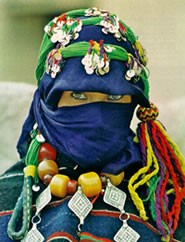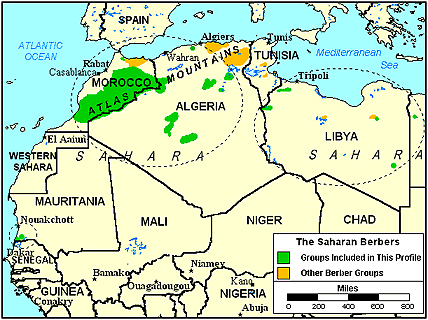Berbers tribes stretch from the Siwa Oasis in Egypt to the Atlantic Ocean. They probably once inhabited the entire North African territory, forcing the black population to move further southward through the desert. However, the origins of the Berbers and how they arrived in North Africa remains a mystery.
The Berbers call themselves the Imazighen, which means "man of noble origin." Their various languages belong to the Hamito-Semitic language family which includes five major groupings as well as many dialects. Although the Berber languages differ greatly from one another in sound, they only vary slightly in grammar and vocabulary.
The name "Berber" is derived from the Latin word barbari, meaning "barbarians." This term was used by the Romans in the third century A.D. to describe the "people of the Maghrib." (The Maghrib refers to the regions of North Africa that were conquered by Muslims between 670 and 700 A.D. It included Morocco, Algeria, Tunisia, and the western portion of Libya.
Although the Maghrib has been, for the most part, "Arabized" by language and Islamic culture over the centuries, there are still groups of Berbers. They are generally divided by region, such as the nine Saharan Berber tribes, who have retained much of their original Berber traditions and characteristics. One of these Saharan Berber tribes is the Filala Berbers. They speak Tachelhit. Much of their lifestyle is the same as the other Berbers of this region.
Since the Sahara Desert is a harsh environment, most of the Saharan tribes occupy several oases. Filala Berber economy rests on a fine balance between farming and raising cattle. Every tribe, without exception, depends heavily on domestic animals for carrying heavy loads, milk and dairy products, meat, and hides or wool. No Berber tribe depends on farming for survival. Hunting rarely adds to the food supply.
Filala Berbers are noted for their skills in various crafts. Domestic tasks such as weaving and pottery are the main work of the women. The men specialize in woodworking, metalworking, and, more surprisingly, fine needlework. Regarding labor, the men do most of the farming, while the women are responsible for milking and gathering.
Filala Berber societies can be broken down into three basic units: the community, the district, and the tribe. The community is a political collection of clans; the district is a cluster of communities; and the tribe is a group of districts that are characterized by a common territory, name and culture. Government at the community level is notably democratic. All authority is vested in an assembly called the jemaa. The jemaa, composed of all adult males, usually meets weekly.
In nearly every Berber society, each district, and sometimes each community as well, is divided into two opposing factions called sofs. Membership into the sof is hereditary. Among tribes that no longer live in their original environments, the political units are allied with one another in identical divisions of higher levels known as lefs. Bonds of alliance are re-confirmed by traditional forms of hospitality as well as by huge annual feasts to which members invite one another. If warfare occurs, it is almost exclusively between districts of the opposite lef. However, since lefs are primarily defensive rather than offensive alliances, their primary purpose is to preserve peace in a region.
Berber groups such as the Filala and other Saharan Berbers, are nominal Muslims. Their observances of Islamic law are generally lax.
The concept of baraka, or holiness, is highly developed in North Africa. The Berbers believe that many people are endowed with baraka, of which the holiest are the shurifa, or the direct descendants of Mohammed.
Another class of holy people is known as the marabouts. Among some Berbers, the Tuaregs in particular, the marabouts are different from ordinary men. They are believed to possess, even after death, the powers of protection and healing.
In view of the general acceptance of Islam, it is particularly interesting that almost all Berbers prefer monogamous marriages. Even the oasis dwellers and the Tuareg hold this preference. In the few tribes where polygamy does exist, it is practiced only by the few wealthy men.
Filala Berbers have few Christian resources available to them. Because it is difficult to reach them geographically, they must be the focus of individual church planting efforts.
The quality of life for the Filala Berbers is quite poor. The need for community development projects may provide open doors through which missionaries may enter. Much prayer is needed to break down the barriers that separate the Filala Berbers from the gospel.
Ask the Lord to call people who are willing to go to North Africa and share Christ with the Filala Berbers.
Pray that God will raise up loving African Christians to reach out to their Muslim neighbors.
Ask God to strengthen, encourage, and protect the small number of Berber Christians who are scattered throughout North Africa.
Pray that God will raise up faithful intercessors who will stand in the gap for the Filala Berbers.
Ask the Lord to raise up a strong local fellowship of believers among the Filala Berbers of Morocco.
Scripture Prayers for the Berber, Filala in Morocco.
Bethany World Prayer Center
| Profile Source: Joshua Project |











